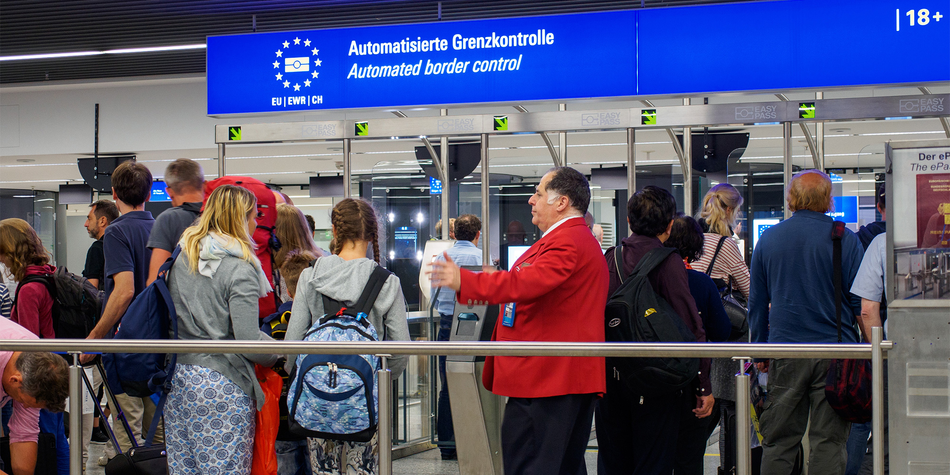EU fingerprint checks could cause six-hour queues at Dover

Wait times at the border are likely to be even longer when the EU’s new entry-exit system is introduced in May next year.
Extra passport checks - requiring non-EU citizens to provide photographs and fingerprints - are expected to increase processing times almost seven-fold.
The Port of Dover has estimated that the time it takes for a car with a family of four to get through passport control could go up from 90 seconds to 10 minutes. Average wait times at French border control are currently around 60 to 90 minutes during peak periods. But under the new rules they could be over six-and-a-half hours.
Confused about the EU's passport rules after Brexit? Read our easy guide to check your passport is valid
What are the extra passport checks?
The EU’s new system of biometric checks will apply to British passport-holders travelling to Europe’s Schengen Area via airports, ports or border checkpoints. Travellers will be required to provide a facial image and four fingerprints. Only children under 12 will be exempt.
Last month Doug Bannister, the Port of Dover’s chief executive, warned that the entry-exit system could cause ‘significant and continued disruption for a very long time’. 50,000 passengers per day travel through the UK’s busiest port during peak weekends in the summer.
In July, tens of thousands of families queued for up to 11 hours at Dover at the start of the school summer holidays. The port said the tailbacks were caused by a lack of French border police, but others blamed the extra passport checks required since Brexit. UK travellers now need to have their passports stamped, which increases the average checking time for each car.
The EU’s new border rules could also cause delays at the Eurotunnel and Eurostar terminals at Folkestone and St Pancras, where French border officials also conduct checks on British soil.
From November 2023, UK travellers will also have to apply for a visa-waiver, which will cost €7 and be valid for three years. The European Travel Information and Authorisation Scheme (Etias) will allow non-EU travellers to visit the Schengen Area without a full visa. It was due to be introduced at the same time as the biometric checks at the border, but the European Commision has postponed it by six months.
Who will the EU’s tougher border rules apply to?
The entry-exit system will register travellers from ‘third countries’, which means everywhere outside the EU and Schengen Area. The UK has been considered a third country since Brexit. The new rules do not apply to EU citizens.
What will travellers need to do?
Non-EU travellers will have to provide biometric data: a facial image and fingerprints. They’ll also have to provide personal data including their nationality, first name and surname, date of birth and sex. Children under the age of 12 are exempt.
When the Etias visa-waiver scheme is introduced in November 2023, they must also apply for an electronic travel authorisation document. You can find more information here.
When will it start?
The EU’s entry-exit system is due to be introduced in May 2023, but the European Commission has postponed the launch date twice.
Will I need to be fingerprinted when I travel to any EU country?
The entry-exit system only applies to Europe’s Schengen Area - a travel zone where you don’t need to show your passport to cross borders. It covers most EU countries, including France, Spain, Italy, Portugal, Greece and Germany, as well as non-Schengen microstates such as Andorra and Monaco. Ireland is not a Schengen country.

Your fingerprints and a facial biometric will be checked every time you cross an external border, and the date and time will be registered.
What will motorists need to do when the entry-exit system is introduced at Dover?
We don’t know yet. Last month the boss of Dover told MPs he had not been given any details of how the entry-exit system will work in practice. Trials of the technology took place last month in Calais.
Doug Bannister, chief executive of the UK’s busiest port, explained that travellers might be asked to register their fingerprints on a tablet that will be passed around the car, but added: ‘We haven’t trialled it. What if it’s a dark stormy night and the lighting is inappropriate? We haven’t tested all of that.’
In 2021, Tim Reardon, head of EU exit for the Port of Dover, warned that there may be safety issues if ferry passengers need to get out of the car to have their fingerprints and photograph taken. He said: ‘That’s the one thing on our site, which cannot happen, because you’re in the middle of live traffic. It would be the equivalent to asking people to get out of their car at a motorway toll booth. It’s fundamentally unsafe and it cannot happen.’


